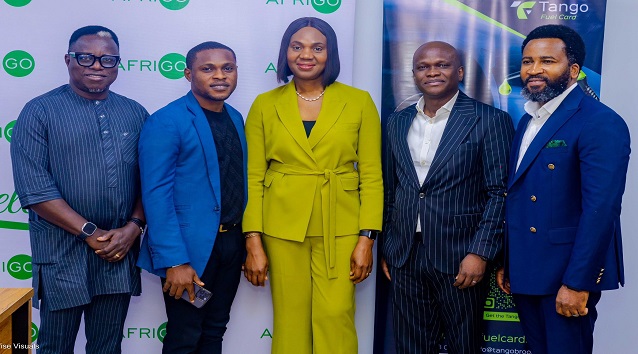E-Business
SecureID Unveils Smart Card Manufacturing Factory

SecureID has unveiled a Smart Card production factory in Lagos.
Vice President Yemi Osinbajo, while touring the firm’s premises, affirmed Nigeria’s bright economic future, which he said cannot be aborted despite current challenges.

According to him, “the economic future of our nation is extremely bright. Yes, we have challenges today and they may look daunting. But let me assure you that these issues will be resolved. The march of this nation to its manifest destiny as Africa’s leading economic power will not be aborted. We are more than able to overcome.”
Osinbajo, commended Buhari administration’s achievements saying, that following the recommendation of the Presidential Economic Advisory Council, the administration has determined that manufacturing will be its main focus in bringing about dynamic growth, jobs and exports.
He said this means retooling the country’s business environment for greater competitiveness, especially with the take-off of the African Continental Free Trade Area agreement.
“We are rethinking our tax regimes, sorting out external and internal trade issues, getting our regulatory authorities; SON, NAFDAC, and even Customs, to see their roles more as business facilitators rather than policemen or revenue generators.
“Our environment must be friendly for local businesses first, foreign investments will follow enthusiastically.” he said.
Commenting on the efforts of the administration to position the country as a leading economic beacon on the continent, the VP also stated that the Buhari administration was ramping up efforts in improving the country’s infrastructure and digital space.
He said: “aside from the work we are doing with other infrastructure such as rail, roads and power we are committed to a plan of democratizing broad band connectivity. Our programme, which we have reiterated in our Economic Sustainability Plan, is broadband connectivity for all by 2023.
“The Federal Ministry of Communications and Digital Economy launched the National Broadband Plan which is designed to deliver data download speeds across Nigeria of a minimum 25mbps in urban areas and 10mbps in rural areas, with effective coverage available to at least 90% of the population at affordable prices by the target date. Broadband connectivity is as important as electricity in the digital age unlike electricity we do not have to make several mistakes before getting it right.”
While commending the efforts of Kofo Akinkugbe, the founder and Managing Director of SecureID, Mr Osinbajo described SecureID facility as a place of history, innovation and creativity.
He said: “this world-class manufacturing facility is reputed to be the first certified smartcard manufacturing plant in sub-Saharan Africa, the only smart card production and personalization plant in West Africa and one of only six on the continent and one of only 80 in the world.
The company is reportedly the first in sub-Saharan Africa and one of the three such cutting-edge facilities on the continent, with top prime global certifications for smart card manufacturing.
E-Business
Tango Brook Technologies Partners with AfriGO on its Smart Fuel Management System – The Tango Fuel Card

Tango Brook Technologies and AfriGO have announced a strategic partnership aimed at redefining the way Nigerians buy fuel. Through this initiative, Tango Brook Technologies and AfriGO aim to make the use of the Tango Fuel Card – a smart fuel management system – a seamless experience at all fuel stations nationwide, with the goal of further strengthening Nigeria’s digital economy.

The AfriGO Card, powered by AfriGOpay Financial Services Limited, a subsidiary of the Nigeria Inter-Bank Settlement System (NIBSS), is a locally developed payment solution designed to enhance financial sovereignty. By leveraging AfriGO’s infrastructure, Tango Brook Technologies is creating more payment options by providing solutions tailored specifically to local market needs.
The Tango Fuel card provides access to physical payment cards accepted at fuel stations nationwide, along with tools, detailed reports, insights, and analytics that help individuals, households, and organisations/fleet managers track and optimise fuel expenditure while preventing fraud. As the card processor for the Tango Fuel Card, the AfriGO card is built to EMVCo standards, ensuring secure transactions through tokenization and contactless payment capabilities. The Tango Fuel card seamlessly integrates these features into its robust digital ecosystem, offering users a seamless and secure payment experience.
A Commitment to Innovation and Accessibility
Managing Director of Tango Brook Technologies,Obi Wemambu said, “The Tango Fuel Card transforms fuel management by giving businesses and individuals real-time visibility into consumption, mileage, and spending at both vehicle and driver levels. With PIN protection, customizable limits, and nationwide acceptance, it offers unmatched flexibility, security, and convenience. Enhanced with built-in rewards, Tango delivers savings while ensuring total control. Today, in partnership with AfriGO, we are launching a future-ready intelligent fuel management solution for individuals and enterprises alike.”
Similarly, AfriGo Pay Financial Services Limited said, “AfriGO is proud to announce a strategic partnership with Tango Fuel, a technology-driven fuel and fleet management platform. This collaboration aims to empower consumers and businesses with smarter tools to track and optimise fuel purchases and consumption.
This collaboration integrates Tango’s innovative fuel tracking solution with the secure and widely accepted payment infrastructure of AfriGO. The joint offering empowers users to seamlessly monitor fuel purchases, optimise consumption, and gain actionable insights—all through a unified, cashless experience.
AfriGO cards enable Tango Fuel Card users to conduct seamless and secure transactions at all fuel stations nationwide, utilizing locally supported payment solutions that enhance their daily financial interactions.
The AfriGO Instant Settlement service ensures that merchants and agents benefit from immediate transaction finalization, leading to greater efficiency, improved cash flow, and reduced risk.
Together, we are committed to driving transparency, efficiency, and digital inclusion in everyday fuel transactions.”
E-Business
Firm Warns Travellers of AI-powered Attacks Targeting Hotel Guests

Between June and August 2025, Kaspersky’s Global Research and Analysis Team (GReAT) discovered a new wave of cyberattacks by a threat group called RevengeHotels, which targets hotels to gain access to guests’ payment information.

The group has been operating since 2015 and has since upgraded its methods. The threat actor is now using Artificial Intelligence (AI) to make their attacks more effective and reach additional regions.
Analysis shows that many of the new malicious programs used in these attacks contain code likely generated with AI, making them more sophisticated and harder to detect.
While hotels in Brazil have been the main target to date, such cyberattacks have also been reported in other countries around the globe.
And considering that countries in Africa, including South Africa and Kenya, are popular tourist destinations, and Nigeria a popular business travel destination, it is important to consider that no country or hotel is immune to falling victim.
How the attacks work
The threat actor sends phishing emails directly to hotel staff, often disguised as requests for reservation or job applications. Once a hotel employee interacts with these emails, malware called VenomRAT is installed on the hotel’s systems, giving attackers access to guests’ payment data and other sensitive information. The emails often look convincing, coming from legitimate-looking websites.
“Сybercriminals are increasingly using AI to create new tools and make their attacks more effective. This means that even familiar schemes, like phishing emails, are becoming harder to spot for a common user.
For hotel guests, this translates into higher risks of card and personal data theft, even when you trust well-known hotels,” comments Lisandro Ubiedo, expert at Kaspersky’s Global Research and Analysis Team.
E-Business
InnovateAI Lagos 2026 to Champion Responsible AI Across Africa

AI in Nigeria, the nation’s leading force in artificial intelligence advocacy and development, today announced the third edition of its flagship annual conference, InnovateAI. The 2026 conference will be a defining moment in the country’s technological evolution, with the theme: “Responsible AI beyond Innovation.”

Building on the successes of its previous editions, InnovateAI 2026 is poised to shape the national conversation on the critical issues of ethics, security, and governance in artificial intelligence. The inaugural InnovateAI 2024, themed “Adapting AI for Nigeria,” successfully catalysed policy discussions and attracted over 4,000 physical attendees, including AI Innovators, Academia, Researchers and Policy Makers engaging in public and private sector discourse on AI.
The recently concluded 2025 conference, themed “Scaling AI Adoption in Nigeria,” expanded the event’s reach to over 6,000 physical participants, with live-streaming to twelve AI in Nigeria’s community hubs in the six geopolitical zones of Nigeria. The conference addressed systemic challenges to scaling AI – talent, data, and compute infrastructure.
The 2026 edition represents a crucial strategic evolution. As AI becomes more deeply integrated into daily life, this conference will shift its focus from adoption to a deep dive into the foundational principles necessary for sustainable and trustworthy growth.
In addition to showcasing responsible AI innovations across industries, the conference will feature a series of focused sessions to explore these vital topics:
- AI Governance in Africa: Establishing a framework for a trusted future.
- Deepfakes, Fraud & Security Risks: Protecting Nigeria’s Digital Society from Emerging Threats.
- AI & Financial Services: Building trust in the fight against fraud and ensuring secure transactions.
- Digital Literacy for All: Preparing citizens for the age of AI through education and empowerment.
- Responsible AI Innovation: Balancing safety and growth to support Africa’s burgeoning startup scene.
“AI is reshaping industries, economies, and societies at an unprecedented pace, but innovation without trust and governance risks leaving people behind. InnovateAI 2026 is a platform to ensure Africa defines its own AI future—one where ethics, inclusivity, and safety guide progress,” said Ehia Erhaboh, Co-Convener, AI in Nigeria.
InnovateAI 2026 is poised to bring together policymakers, industry leaders, technology experts, and the public to forge a path forward that ensures AI serves as a force for good, fostering inclusive opportunities, improving healthcare, and enabling smarter governance.
Organizations looking to shape Africa’s AI future are invited to become a partner or sponsor for InnovateAI 2026. This is a unique opportunity to demonstrate leadership in the responsible AI movement, gain targeted visibility among key stakeholders, industry leaders, policymakers, innovators, and investors – positioning themselves at the forefront of Africa’s responsible AI movement. Your support will directly contribute to a vital national dialogue on AI governance and digital literacy, helping to create a safer, more inclusive, and prosperous future for Nigeria and Africa as a whole.
“This is not just a conference, it’s a catalyst for shaping Africa’s digital future,” said Dotun Adeoye, Co-Convener, AI in Nigeria. “Our partners’ support is essential in building a more equitable, secure, and prosperous AI ecosystem for Nigeria and beyond.”

 General News3 days ago
General News3 days agoLBS Described Digital Transformation in Banking, Others as Fueling Nigeria’s Economic Evolution

 E-Business3 days ago
E-Business3 days agoExperts Seek Engagement on AI Adoption for Governance Standards

 News3 days ago
News3 days agoFire Incident: Afriland Properties Attributes Afriland Towers Blaze to Inverter Room Malfunction

 E-Business3 days ago
E-Business3 days agoNITDA Empowers 3,600 Teachers Nationwide to Lead Nigeria’s Digital Literacy Transformation

 News3 days ago
News3 days agoMTN Nigeria Backs Cloud Accelerator Program with N100m

 News3 days ago
News3 days agoPenCom Redesigns Pension Plan, Targets Informal Sector

 Telecom2 days ago
Telecom2 days agoAirtel Africa Extends $100M Share Buyback Plan

 News2 days ago
News2 days agoCAC Unveils Measures to Ease Company Registration
























